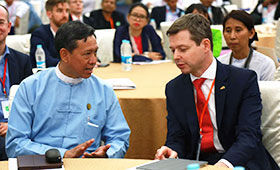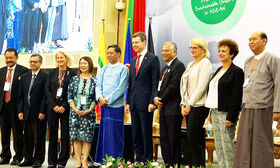Myanmar proudly hosted the 4th Regional TVET Conference
The eyes of stakeholders from the field of technical and vocational education and training turned to the fourth Regional TVET Conference 2017 that was hosted this time by Myanmar. It took place from 13 to 14 June 2017 in Nay Pyi Taw, followed by a field trip in Yangon on 15 June 2017.

The conference under the title “Improving TVET – Priorities for Sustainable Growth in ASEAN” attracted over 270 participants from more than 20 countries like policy makers, practitioners and academia, key actors from the public and private sector as well as diplomatic agencies. In his speech, the Parliamentary State Secretary to the Ministry for Economic Cooperation and Development, Mr. Thomas Silberhorn, set the frame by defining sustainable growth as making sure through the careful and responsible use of a country’s resources the entire society benefits from growth.” Insightful discussions focusing on the future of improved TVET and its contribution to sustainable economic growth in the ASEAN region involved all participants.
The Regional TVET Conference 2017 was jointly organized by the Myanmar Ministry of Education, the Federal Ministry for Economic Cooperation and Development (BMZ) and the Asian Development Bank (ADB). The speakers, high-ranking representatives of the Myanmar Ministry of Education, the BMZ and the ADB undoubtedly added splendour to this outreaching event. It was highlighted by the Myanmar Minister for the Office of the State Counsellor H.E. U Kyaw Tint Swe that “since the ASEAN Economic Community establishment at the end of 2015, the strengthening of technical and vocational education and training (TVET) as well as the facilitation of skilled labour mobility across ASEAN’s common labour market, have become a high priority for the ASEAN community.”
Ms. Ayako Inagaki, Director of the Human and Social Development Division from the Southeast Asia Department of the ADB emphasized that “Myanmar government has been extremely active in the [TVET] sector (…) accomplishing the comprehensive education sector review as a land-mark, which led to the formulation of the National Education Strategic Plan for 2016-2021, (…) one of the first rigorous assessments of the sector in two decades.” The conference participants agreed that the achievements of the Regional TVET Conference 2017 in Myanmar should throw light and serve as a reference point for the future development of TVET in the ASEAN region. The main challenges awaiting TVET in ASEAN could be the standardisation process and creating the new image of TVET, as well as learning how to learn throughout the whole life, as the longevity has increased and people change employment on a more frequent basis, as suggested Dr. Brajesh Panth, Technical Advisor (Education) from the Asian Development Bank.

This Regional TVET Conference in Myanmar crowned a series of Regional TVET Conferences organized by the Federal Ministry for Economic Cooperation and Development and its regional Partners in Vietnam (2012), Indonesia (2014) and Laos (2015). This well illustrates the words of the Parliamentary State Secretary to the Minister for Economic Cooperation and Development who stated that the main focus of the German development cooperation with the ASEAN countries is the vocational education and training. This year’s Conference was guided by principles of interactivity, outcome orientation and sustainability. The most vividly discussed topics were Labour markets and skills in the digital era, Sustainable employer engagement in TVET and TVET Personnel in the 21 century. While importance of TVET personnel and the involvement of the business sector in the TVET became a highlight rooted from the previous Regional TVET Conferences, the session Labour markets and skills in the digital era constituted a vital component of the Conference proceedings and is considered a priority of all key players as it is a leapfrogging development.
The Regional TEVT Conference 2017 in Myanmar fulfilled several important objectives. Besides concluding a very successful series of Regional TVET Conferences in the ASEAN region, it also brought the Federal Ministry for Economic Cooperation and Development, Myanmar Ministry of Education and the Asian Development Bank closer to each other by creating value added cooperation, but it also inspired long-reaching changes in the ASEAN region and beyond. Dr. Shyamal Majumdar highlighted in his closing panel remark, “we’d like to see this dialogue to be continued. I heard this is the fourth and the last one. Don’t make it the last one, keep the momentum. Then, you are making a half-journey. When you have taken the road, let’s take it and finish it.” Let’s hope that this spirit among the policy-makers, university environment, public and private sector engaged in the TVET sector will be maintained as a priority for the sustainable growth in the ASEAN region.
The Regional TVET Conference certainly placed Myanmar in the centre of a multinational discussion concerning the future of skilled workforce in the ASEAN region. As the Myanmar Minister for Education Dr. Myo Thein Gyi highlighted, “with the encouragement of H.E. State Counsellor Daw Aung San Suu Kyi, more and more youths and parents [in Myanmar] are interested in TVET that constitutes the first-class education. (…) Education plays the key role in building peace, reducing poverty, adjusting tolerance and building a learning generation.”
Author: Joanna Dolinska, Consultant at the “Promotion of TVET Project” at the Deutsche Gesellschaft für Internationale Zusammenarbeit (GIZ) GmbH